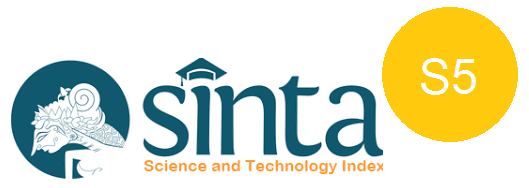Figurative Languages in The Shape of Water Movie
DOI:
https://doi.org/10.47313/pujangga.v10i1.3437Keywords:
figurative language, , linguistics, movieAbstract
Films, as literary works, use numerous types of language to communicate meaning, provoke emotions, and tell stories successfully. The auditory and symbolic elements are part of the languages associated with figurative language that refers to written or spoken communication, its principles and effects can also be applied in visual storytelling, which is a key aspect of the film itself. Understanding figurative language in a movie is a challenge for language enthusiasts as it involves interpretation and awareness of cultural and contextual influences on meaning. This study, exploring the use of figurative language in ‘The Shape of Water’ movie, employed a descriptive qualitative approach, which provides a factual and accurate description of the issue or area of interest. The study found that the film used seven language styles: personification, metaphor, simile, euphemism, metonymy, and allegory. Each figure of speech appears in varying quantities, In addition, there were fifteen sentences out of forty-six data containing similes which means people are most familiar with similes in literary works, notably in movies.
References
Anggraeni, P., Januarius, M., & Ahmad, S. (2018). The Implementation of Transposition Translation Procedures in English-Indonesian Translation of Epic Movie Subtitle. Journal of English Language Teaching, 7(2), 1–7. http://journal.unnes.ac.id/sju/index.php/elt
Chakrabarty, T., Saakyan, A., Ghosh, D., & Muresan, S. (2022). FLUTE: Figurative Language Understanding through Textual Explanations. Proceedings of the 2022 Conference on Empirical Methods in Natural Language Processing, EMNLP 2022, 7139–7159. https://doi.org/10.18653/v1/2022.emnlp-main.481
Dojack, L. (2023). the Role of Stylistic Analysis of Figurative Language in Shaping the Theme of Race in Chimamanda Adichie’S “Americanah.” IJRDO - Journal of Social Science and Humanities Research, 9(8), 52–62. https://doi.org/10.53555/sshr.v9i8.5808
Ferawati, F., Baa, S., & Iskandar, I. (2022). Investigating Rupi Kaur’s selected poems: an analysis of figurative language. International Journal of Humanities and Innovation (IJHI), 5(1), 20–26. https://doi.org/10.33750/ijhi.v5i1.142
Meriam-Webster. (n.d). Movie. In Merriam-Webster.com dictionary. Retrieved March 3, 2024, from https://www.merriam-webster.com/dictionary/movie.
Miun, E. R., I Gusti Ayu Vina Widiadnya Putri, & I Dewa Ayu Devi Maharani Santika. (2022). Meaning of Figurative Language Found in John Legend’S Album Entitled “Love in the Future.” ELYSIAN JOURNAL : English Literature, Linguistics and Translation Studies, 2(1), 83–93. https://doi.org/10.36733/elysian.v2i1.2521
Nordquist, Richard. (2018). Meaning Semantics. Glossary of Grammatical and Rhetorical Terms.Retrieved May 28, 2024, from https://www.thoughtco.com/meaning-semantics-term-1691373
Nordquist, Richard. (2019).Conceptual Meaning: Definitions and Examples.Words carry many different types of meaning. Retrieved May 28, 2024, from https://www.thoughtco.com/conceptual-meaning-words-1689781
Nurhaida, N., & Marlina, L. (2017). An analysis of figurative language in views (opinion column) of online padang ekspres newspaper. E-Journal of English Language & Literature, 6(2), 44–52. http://ejournal.unp.ac.id/index.php/jel
Palupi, M. E. (2021). an Analysis of Figurative Language Used in Poem of the Echoing Green By William Blake. Journal of English Language and Literature (JELL), 6(2), 9–20. https://doi.org/10.37110/jell.v6i2.131
Sherman, R, Robert and Webb, B, Rodman. (1988). Qualitative Research In Education: Focus and Methods. London: New York, Falmer Press.
Welan, C. H. (2016). Figurative Languages Used In Movie Taglines Claudya Hein Welan. 04, 128–135.
Wibisono;, R. T., & Widodo, P. (2019). An analysis of figurative language in online short story posted on the jakarta post. Journal Of Linguistic, 4(2), 156–165.
Downloads
Published
Issue
Section
License
Copyright (c) 2024 fadilah fadilah, Nurhayati S

This work is licensed under a Creative Commons Attribution-ShareAlike 4.0 International License.

Ciptaan disebarluaskan di bawah Lisensi Creative Commons Atribusi 4.0 Internasional.







